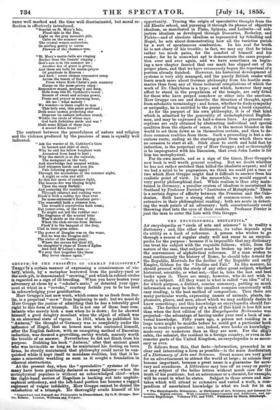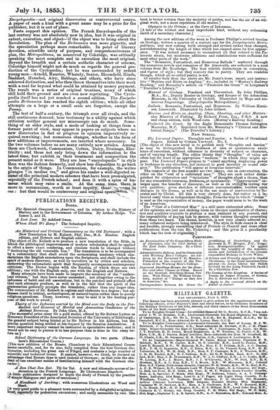THE ENCYCLOPIEDIA BRITANNICA. * AN encyclopfedia or "circle of arts and
sciences" is in reality a dictionary ; and, like other dictionaries, its value depends upon its utility as a book of reference. A person who wishes to go through a course of regular study will not recur to an eneyelo- psedia for the purpose : because it is impossible that any dictionary can treat his subject with the requisite fulness; while, from the nature of the case, that subject must be broken up into parts for the convenience of alphabetical reference. If a man wishes to read continuously the history of Rome, be should take Arnold for the Republic, Merivale for the decline of the Republic and early Empire, Gibbon for the " Decline and Fall." In like manner, he should proceed with the study of any other great subject, whether historical, scientific, or what not,—that is, take the last and best books upon it. There are many, however, who do not wish to study a subject. All they want is what is called "au idea" of it; for which purpose, a distinct, concise summary, putting as much information as may be into the smallest compass consistently with easy reading, is the best method of composition. Then there are many particular words, expressing names of animals, plants, im- plements, places, and men, about which we may suddenly desire to know something; and this knowledge an encyclopmdia should fur- nish. The further necessity of a work of this kind is less felt now than when the first edition of the Encyclopedia Britannica was projected—the advantage of having under your roof a book of uni- versal knowledge. Fifty years ago, a person not residing in a large town might be months before he could get a particular book even to resolve a question : nor, indeed, were books on knowledge- made-easy so numerous then as they are now. For the ship's cabin, the colonist, the resident in a foreign country, or even in the remoter parts of the United Kingdom, an encyclopEedia is as neces- sary as ever. It follows from this, that facts—information, presented in as clear and interesting a form as possible—is the main desideratum of a Dictionary of Arts and Sciences. Great names are very good for an advertisement to attract the world at large ; in science they become important, because a great name is a guarantee for aeon- racy and soundness. A litterateur may toss off an essay on poetry or any subject of the belles lettres without much oare for the truth of his positions; but an astronomer or a chemist, for example, will be exact in what he states. Subject to those errors and mis- takes which will attend so extensive and varied a work, a com- pendium of ascertained knowledge is what we look for in an • The Eneydopredia Britannica; or Dictionary of Art, Sciences, and General Li- terature. Eighth edition. With extensive Improvements and Additions, and nu- merous Regravings. Volumes-VIL and VIII. Pisblishecl. by Black Etilabtuflt. Bncyclopodia—not original discoveries or controversial essays. A paper of snob a kind with a great name may be a prize for the publisher, but it is out of place. Facts support this opinion. The French Encyolopeedia of the last century was not absolutely new in idea, but it was original in extent, execution, and object—if the object was to bring about the Revolution. The plan of the Britannica was more gigantic, and the speculation perhaps more remarkable. In point of literary devotion, scientific unity of purpose, and comprehensiveness of plan, the Metropolitan, as conceived by Coleridge, was critically speaking the most complete and in execution the most. original. Beyond the breadth and a certain esthetic character of scheme, Coleridge himself might not do much, as regards the general pro- duction of the Cyclopedia; but he was surroundedby ardent. young men—Arnold, Maurice, Whately, Senior, Bloomfield, Hinds, Stoddart, Herschel, Airy, Babbage' and others, who have since achieved distinction, and who then threw themselves into their work with a. zeal far beyond what could be attained by money payment. The result was a series of original treatises, many of which still hold their ground and are even now reprinting. The Cyclo- ptedia itself has not yet reached a second edition. The Encyclo- pedia Britannica has reached the eighth edition; while all other attempts on a large or a small scale are forgotten, except the Penny.
The test of half-a century, the triumph over all rivals, and the still continuous demand, bear testimony to a utility against which criticism neither general nor microscopic can do much. Some- thing of an elder style, and a mode of looking at things from a former point of view, may appear in papers on subjects where no new discoveries in fact or progress in opinion imperatively re- quired rewriting ; but numerous changes, whether in the form of new additions or improvements, are inserted where necessary. In the two volumes before us are many entirely new articles. Among them are Clockwork, Communism, Cotton, Dairy, Drainage, Elec- tricity ; and these not only bring down the information to the latest thus but exhibit: in their treatment and composition the present mind as it were.' They are less "encyclopaedic," in style than was the fashion formerly, and show less disposition to go back to the origin of things. In Communism, for example, the writer plunges "in medias res," and gives his reader a well-digested re- sume of, the principal modern schemes that have been promulgated, especially of the French school ; and does it with a spice of hu- mour which may raise a smile. At the same- time, there,, is to
more in communism, worth at least inquiry, than-% see : but that would be controversy and original speontut,tien.



























 Previous page
Previous page